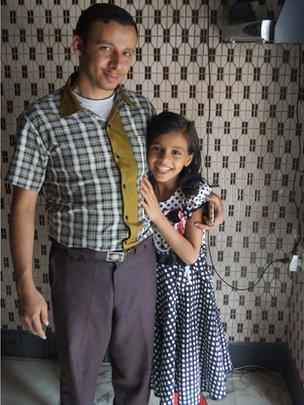Girl's online plea highlights plight of Yemen's child brides
- Published

Nada's uncle took her in after she ran away
In a three-minute video posted online, Nada al-Ahdal, a slight and pretty 11-year-old girl, has caught the attention of millions in her home country, Yemen, and abroad, as she tells her story.
Sitting in a car, she speaks to the camera eloquently and forcefully, and tells of an alleged attempt by her parents to forcibly marry her to an older man.
"Does it satisfy you for me to be married? Does this satisfy you?... Mum, accept this: I don't want you. You killed my dreams, all of them."
The video went viral, first in Arabic, and then in a version that was translated into English, and clocked over seven million views in three days.
However, since it first emerged, a number of sides, including Nada's parents, have disputed the child's story.
The case has thrown a spotlight on the contentious issue of the forced marriage of children in Yemen, where it is a socially accepted custom in some areas.
Some Yemeni social media users reacted negatively to the video itself, feeling that it was wrong to expose Nada's parents to public criticism, as it was not in keeping with Yemeni traditions.
"I swear this is shameful. How can you bash the girls of Yemen like this… You've embarrassed us… This is the start of her going astray," was the reaction of one Yemeni Facebook user.
Nada is now in the custody of the Yemeni Women's Union, a women's rights NGO.
Nada al-Ahdal says she ran away from home to avoid marriage
Ramzia al-Eryani, the head of the organisation, maintains that Nada's story is genuine, and not uncommon.
"This is not the first time this has happened, there have been far worse cases. Only last week we had two cases that were much worse," she said.
Prevalent
The issue of child marriage in Yemen began to hit the international headlines with the case of Nujood Ali, who was nine years old when, in 2008, she escaped her two-month marriage and went to court seeking a divorce.
She was granted one, and went on to win international awards, as well as publishing a book, I am Nujood, Age 10 and Divorced.
In 2009, there were attempts by Yemeni parliamentarians and civil society groups to get a law passed restricting marriage to those who are 18 years and over.
However, this failed after opposition from hardline conservative MPs, and a fatwa from Abdulmajeed al-Zindani, a prominent cleric.
The official marriage age remains 15, a law set in 1994, although the law is vague and not widely implemented.
Despite the national and international attention, child marriage remains prevalent in Yemen.
The International Center for Research on Women records in a study, external that 48.9% of Yemeni females were married before the age of 18.
According to the Gender Development Research and Studies Centre at Sanaa University, up to 65% of marriages between 2010 and 2012 involved children, rising to 70% in rural areas.
Alaa al-Eryani, a feminist blogger, who was one of the first to write on Nada's case, says there is a discrepancy between people living in rural and urban areas in their reaction to Nada's case, and child marriage in general.
"If you go to a small village, they would tell you that she's crazy for running away from her parents, if you go to these villages, eight-year-olds are being married… Here in the city, where people are generally more educated and aware, they would tell you that it shouldn't happen."
Ms al-Eryani remains optimistic that Nada's case will cause some change.
"I hope it was a wake-up call for some people," she says.
'Strong and brave'
Meanwhile, Nada's uncle, Abdulsalam al-Ahdal, who took her in, says the majority of the family, and wider society, have given him and Nada their support.
He says any negative reactions to Nada are the result of what he describes as a misuse of religion to justify child marriage.
"There wasn't a problem. The whole family knows she is strong and brave, and that this is a decision that she has taken for her future."
He also says that Nada is adamant that she will not return to her parents.
"Nada is saying that she has a choice - she doesn't want to be with her mother under these circumstances. If they force her, she will run away again, or she says she will commit suicide."
Nonetheless, Nada, clearly not fazed by the events of the past few weeks, appears to be regaining the dreams she once had.
"I want to be a singer," she exclaims excitedly, as her uncle watches on, "I want to be a star!"